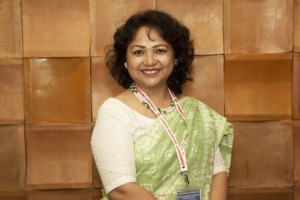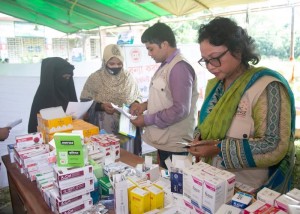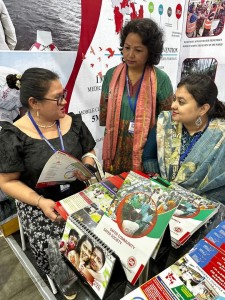【A-PAD Bangladesh】 Staff Interview – DCHT Hashi Chakma
2025.03.27
At A-PAD, staff with diverse backgrounds and expertise are working to leverage their respective strengths. In this installment of our staff interview series, we interviewed Hashi Chakma from A-PAD Bangladesh’s partner organization, Dhaka Community Hospital Trust (DCHT).

Q. How did you start working at A-PAD?
A. I have been working at DCHT since 2007, before the establishment of A-PAD. My introduction to DCHT was through a relative who worked in the management department of DCHT. At the time, I was a student majoring in nutrition at university, but I was approached by Chairman Dr. Zaman and joined the management department as a part-time employee.
Q. Please tell us about your past and present job responsibilities.
A. I initially joined DCHT as an administrative staff member, but I am currently serving as the coordinator of the health center in the Rohingya refugee camp in Cox’s Bazar. In emergencies, I actively participate as a member of the emergency response team and provide immediate support. I also provide logistical support to ensure the smooth implementation of major events such as international symposiums hosted by A-PAD Bangladesh.
Q. What motivates you in your work?
A. Since this was my first job after graduating, I never considered changing jobs. This is because DCHT provides opportunities to build a career. DCHT ensures the safety, stability, and independence of its female staff. While there are various companies in Bangladesh, most of the top executives are men, but I have been able to develop my skills through my current job. For example, in the Rohingya project in Cox’s Bazar, which I am currently in charge of, my colleagues always give me their full support and trust me whenever I have to make a decision.
In addition, Chairman Dr. Zaman encourages staff members to pursue graduate studies. While working at DCHT, I obtained an MSc (Master of Science) and an MBA (Master of Business Administration). Furthermore, DCHT’s medical care is very comprehensive. Medical care is important to our lives but involves various costs, so it is very helpful that medical services are provided at the workplace. We can consult and obtain information at work when staff members or their families get sick.
Above all, all of my colleagues are very friendly, we work very well as a team, and we understand each other well, so I feel that DCHT is like a second family to me.
Q. Are there any difficulties you experience in your work? How do you overcome them?
A. Working with government officials can be challenging. A particularly big problem is the long waiting times, which can extend into the night, and having to wait outside for hours without a waiting room. Even for urgent project applications for disaster response, there are cases where we make an appointment at 3 pm and end up waiting until 8 pm when the person in charge actually shows up. If it’s not urgent, we might not be able to meet on the same day and have to visit every day. However, the team supports me so that female staff members are never left waiting alone.
Q. Finally, do you have any words you would like to share?
A. I strongly hope to continue providing humanitarian assistance in my current field. When I first joined as a staff member in the management department, DCHT was much smaller than it is now, but it has grown as an organization over the past 20 years. I would like to further build connections with international organizations, expand our network of experts, and enhance DCHT’s global presence. I hope that DCHT will become an internationally recognized and influential organization in the broader humanitarian aid sector.






